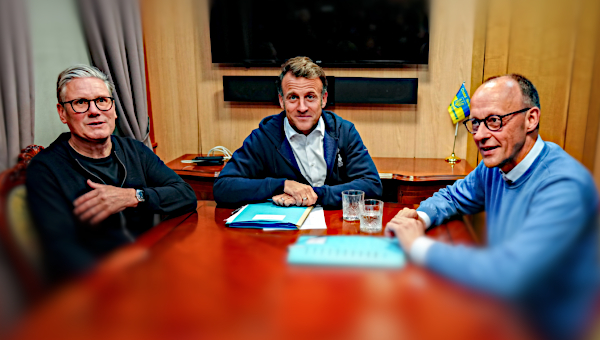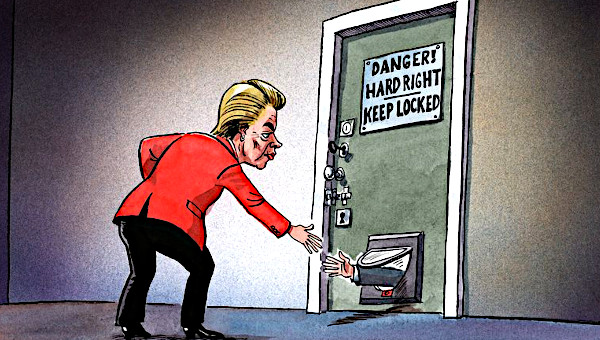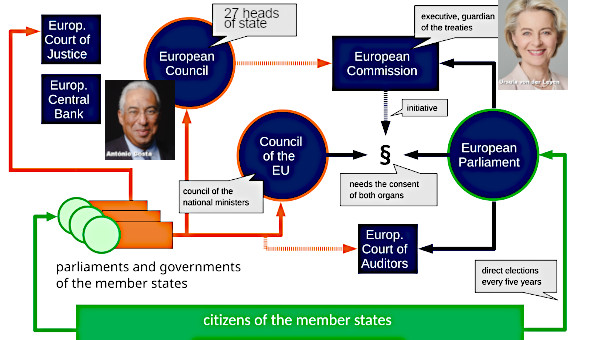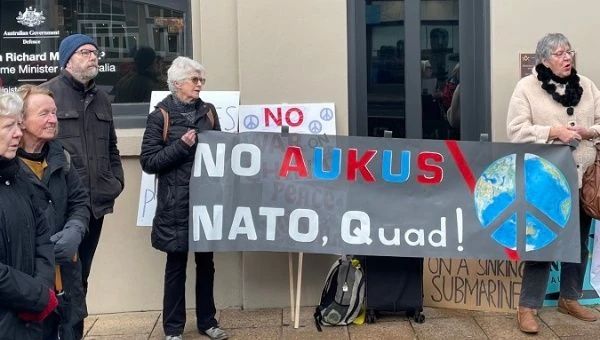The New European Parliament Confirms Its Militaristic Credentials
A new 720-person European Parliament was elected in June, and it held its first plenary session in Strasbourg from 16 to 19 July. That first session immediately sets the tone we can expect from that parliament over the next five years: the tone of military marching music.
The first manifestation of this is the parliamentary approval of Ursula von der Leyen for a second term as head of the European Commission. Her presidency started in 2019 under the banner of the European Green Deal, but as this diluted into little more than a mantra, the former German defence minister emerged as a passionate advocate for the militarisation of the European Union. Not with ritualistic formulas but rather with billions of euros of support for the European arms industry, with pledges of arms supplies until Ukraine’s complete military victory. Her ‘foreign minister’ Josep Borrell, the so-called ‘High Representative of the Union for Foreign Affairs and Security Policy’, even advocated the promotion of a real war mentality in Europe.
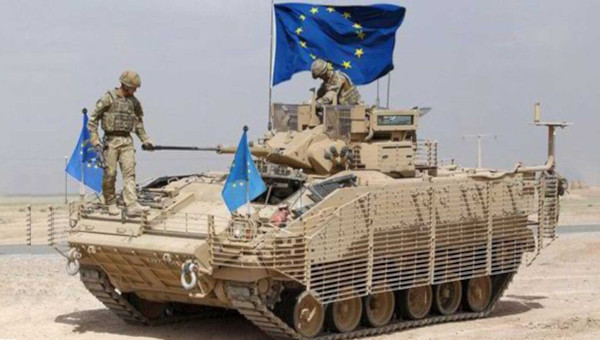
Von der Leyen II
Von der Leyen was thus approved for a second term by Parliament, by her own European People’s Party; by fellow-travellers from social democrats, liberals, and greens] and by part of the far-right ECR. Even Manon Aubry, co-chair of the radical-left parliamentary group (‘The Left’) and a member of Mélenchon’s France Insoumise, thought it necessary to congratulate von der Leyen with a close embrace at the ‘good’ news, and this under the approving eye of the other left-wing president Martin Schirdewan (Die Linke).1 Voting out the Commission President-designate was one of the few ways the Parliament could have shown its dislike of the EU’s militarisation course, but von der Leyen’s re-election acts as a parliamentary legitimation of that course. At the same time, the Parliament’s otherwise so diligent defenders of the rule of law turned a blind eye to von der Leyen’s secret dealings with Big Pharma when concocting the Covid-vaccine contracts. Her haughty refusal to abide by the public transparency rules was even condemned by the General Court of the European Union, but most members of Parliament were not impressed.
Coming back to the EU’s militarisation, the member states’ choice of Estonian Prime Minister Kaja Kallas as the new ‘High Representative’ to succeed Josep Borrell confirms Europe’s ambition to become not just a trading bloc, but also an armed power bloc to strengthen Western dominance in the world. The Israeli government welcomed her appointment, as Borrell was considered an enemy of Israel because of a few remarks about human rights violations in Gaza. No such remark is to be feared from Kallas.
Ukraine Resolution
Back to the first session of the new European Parliament. As already mentioned, this parliament has hardly any say in the Union’s foreign policy, but that does not prevent it from passing resolutions on whatever they like. Although of no binding value, they do give the impression to the outside world that “the Parliament is working on it.” And such was the case with the “European Parliament resolution of 17 July 2024 on the need for the EU’s continuous support for Ukraine.” Needless to say, it strongly condemns the invasion and occupation of parts of the country, the large-scale destruction and the horror that war means for the civilian population. But when it comes to the interpretation and possible solutions to this war, the vast majority of the Parliament supports the idea that this is a higher-level struggle, between Western values of democracy and rule of law on the one hand and autocratic regimes on the other. Quote: “The Parliament recalls that Russia’s war of aggression against Ukraine is part of a broader set of objectives against the West, against our democracy and our values.” Once the framework is outlined as ‘the West versus the rest’, it is logical that it should then be about the West’s strong arm, NATO: “The Parliament welcomes the outcome of the NATO summit and reiterates its belief that Ukraine is on an irreversible path to NATO membership.” Furthermore, the Parliament “welcomes the decision by NATO guaranteeing military supplies worth at least €40-billion in the near future.”
And then come the more practical aspects. While the Parliament cannot decide on these, it can make recommendations:
“The Parliament calls for the EU and its Member States to increase their military support to Ukraine for as long as necessary and in whatever form necessary; reiterates its previous position that all EU Member States and NATO allies should collectively and individually commit to supporting Ukraine militarily with no less than 0.25% of their GDP annually.”
And whereas several governments are reluctant to cross the red line of Ukrainian operations on Russian territory, the Parliament “strongly advocates for the removal of restrictions on the use of Western weapons systems delivered to Ukraine against military targets on Russian territory.” One looks in vain in the resolution for any call for EU leaders to take a peace initiative, and instead of a plea for de-escalation, there is this call for lifting any restrictions…
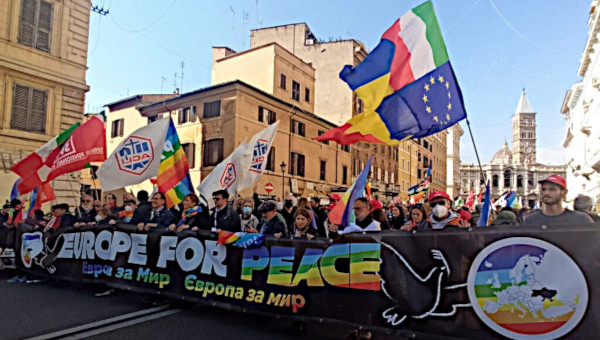
How They Voted
The resolution was rejected by 137 (out of 720) EP-members, 47 abstained and 495 approved. The ‘yes’ camp consisted, first of all, of the almost full ranks of Christian Democrats (European People’s Party), Social Democrats (S&D), Liberals (Renew) and Greens, the same ‘extreme centre’ that considered von der Leyen worthy of a second term. But the resolution was approved by almost 100 more representatives than von der Leyen received votes. Part of the explanation2 is that some of the elected members of her own European People’s Party, who still find even a watered-down Green Deal too far-reaching, voted against her re-election, even though they are hard-line supporters of a collision course with Russia.
The contribution of the far-right is harder to assess. In any case, the identification “far-right = pro-Putin = contra Ukraine” is wrong. Part of the far right seems to see in the Putin regime a continuation of Soviet communism and is therefore vehemently anti-Kremlin and pro-NATO: the Polish PiS, Meloni’s neo-fascist Fratelli in Italy, the Spanish Vox.3 The awarding of high-level jobs is another element. Far-right electoral success in the recent European elections was not translated into the allocation of important positions in the institutions, with repercussions for von der Leyen’s re-election, but not diminishing the anti-Russian pro-NATO stance of a number of central- and east-European member states.
But what concerns us most from the left point of view is that part of the so-called radical left is lustily marching along behind the EU military brass band. Less than one-third (15) of the 46 MEPs belonging to ‘The Left’ voted against the resolution! Of these 15, 8 were from the Italian Five Star Movement, which joined The Left only in July. By contrast, 18 members of The Left agreed to the resolution, and 13 abstained.
The already mentioned Manon Aubry (La France Insoumise), co-chair of The Left, voted in favour, as did the other 8 elected members of LFI. The other group co-chair, Martin Schirdewan, abstained, as did Carola Rackete, who together with Schirdewan led the European list of Die Linke. This leaves Özlem Demirel as the sole Die Linke naysayer against the EU militarist course… The two elected members for Belgium’s PVDA/PTB, Kennes and Botenga, also opted for abstention.4 It must be said that the six elected members of BSW, the Bündnis Sahra Wagenknecht that broke with Die Linke and did not join The Left group, all voted against the resolution.
Now the peace movement will be watching out to see which political forces it can, in fact, still count on. One already regrets the non-re-election of the Irish Clare Daly and Mick Wallace, eloquent and ardent peace activists, averse to any Europeanist hypocrisy. •
Endnotes
- See Youtube video starting at about 35 min 50sec.
- The vote on a second term for von der Leyen was secret, what makes precise statements on voting behaviour impossible. In contrast, the vote on the Ukraine resolution was public, one knows exactly who was for or against or abstained.
- See e.g. Rosa Luxemburg Foundation, Jan Rettig, “The Far Right in the European Parliament.”
- On the Ukraine resolution, the party published an article clearly stating that the EU’s stance is unacceptable, even posing the question whether we are sleepwalking toward a third world war. But without any explanation, the PTB/PVDA states “We then abstained in the vote.”


